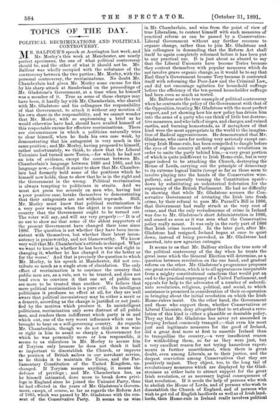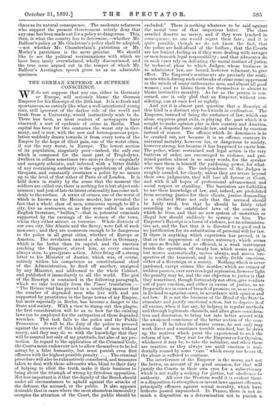TOPICS OF THE DAY.
POLITICAL RECRIMINATIONS AND POLITICAL CONTROVE RSY.
MR. BALFOUR'S speech at Accrington last week, and Mr. Morley's this week at Manchester, are nearly perfect specimens, the one of what political controversy should be, and the other of what it should not be. Mr. Balfour was wholly occupied with the substance of the controversy between the two parties ; Mr. Morley, with the personal controversy, the recriminations. No doubt Mr. Chamberlain had given Mr. Morley some excuse for this by his sharp attack at Sunderland on the proceedings of Mr. Gladstone's Government, at a time when he himself was a member of it. True as some of those charges may have been, it hardly lay with Mr. Chamberlain, who shared with Mr. Gladstone and his colleagues the responsibility of that Government, to attack it without any mention of his own share in the responsibility, and we cannot wonder that Mr. Morley, with so unpromising a brief as he would otherwise have had, should have availed himself of this respectable excuse for effective recriminations. There are circumstances in which a politician naturally tries to clear himself, when he finds his own case weak, by demonstrating that his antagonist is very much in the same position ; and Mr. Morley, having proposed to himself, rather unfortunately, we think, to show that the Liberal Unionists had turned mere Tories,—for which he had not an iota of evidence, except the contrast between Mr. Chamberlain's language between 1880 and 1885, and his language now,—found it easier to show that Mr. Chamber- lain had formerly held some of the positions which he himself now holds, than to show that he is in the right and the Government in the wrong. Political recrimination is always tempting to politicians in straits. And we must not press too severely on men who, having but a poor positive case, betake themselves to demonstrating that their antagonists are not without reproach. Still, Mr. Morley must know that political recrimination is a very poor weapon when the object is to convince the country that the Government ought to be turned out. The voter will say, and will say very properly:—' It is of no use to show me that some of the ablest supporters of the present Government have changed their tone since 1886. The question is not whether they have been incon- sistent with themselves, but whether their latest incon- sistency is praiseworthy, and not blameworthy. We know very well that Mr. Chamberlain's attitude is changed. What we want to know is, whether he has been wise and right in changing it, whether he has changed it for the better or for the worse.' And that is precisely the question to which Mr. Morley, in his speech at Manchester, did not con- tribute so much as a single atom of elucidation. The only effect of recrimination is to convince the country that public men are, as a rule, not to be trusted, and does not tend even to convince it that one set of public men are more to be trusted than another. We believe that mere political recrimination is a pure evil. On intelligent politicians it produces no effect at all, for they are well aware that political inconsistency may be either a merit or a demerit, according as the change is justified or not justi- fied by the motives which produce it. In unintelligent politicians, recrimination only sows distrust of all public men, and renders them indifferent which party is in and which out, one of the very worst influences which can be brought to bear on a self-governing country. As regards Mr. Chamberlain, though we do not think it was wise or right in him to assail so sharply a Government for which he was personally more or less responsible, it seems to us ridiculous in Mr. Morley to accuse him of Toryism only because he does not think it half so important to disestablish the Church, or improve the position of British sailors in our merchant service, as he thinks it to maintain the Union, and the Par- liamentary Constitution of the United Kingdom, un- changed. If Toryism means anything, it means the defence of privilege ; and Mr. Chamberlain has, as he himself intimated, done more to break down privi- lege in England since he joined the Unionist Party, than he had effected in the years of Mr. Gladstone's Govern- ment, except, of course, so far as regards the Reform Act of 1885, which was passed by Mr. Gladstone with the con- sent of the Conservative Party. It seems to us wise in Mr. Chamberlain, and wise from the point of view of true Liberalism, to content himself with such measures of practical reform as can be passed by a Conservative- Liberal Government without any further recourse to organic change, rather than to join Mr. Gladstone and his colleagues in demanding that the Reform Act shall itself be again completely reformed before it has been put to any practical use. It is just about as absurd to say that the Liberal Unionists have become Tories because they content themselves with popular measures which do not involve grave organic change, as it would be to say that Earl Grey's Government became Tory because it contented itself with reforming the Poor-Law and the Criminal Law,. and did not encourage agitation for household suffrage before the efficiency of the ten-pound householder suffrage had been even so much as tested.
Mr. Balfour sets the true example of political controversy when he contrasts the policy of the Government with that of the Opposition, treating Mr. Gladstone with the most perfect respect, and yet showing how his new policy has driven him into the arms of a party who can think of little but destruc- tive measures, and who talk of sieges, and charges, and ruined.
castles, and burning homesteads, as if metaphors of that kind were the most appropriate in the world to the imagina- tion of Radical aggressiveness. He demonstrated that Mr. Gladstone, who cares for nothing very seriously except car- rying Irish Home-rule, has been compelled to dangle before the eyes of the country all sorts of organic revolutions in order to unite the party behind him,—a very great portion of which is quite indifferent to Irish Home-rule, but is very' eager indeed to be attacking the Church, destroying the House of Lords, carrying out the principle of democracy to its extreme logical limits (except so far as these seem to involve playing into the bands of the Conservative wire- pullers), and generally turning the Constitution upside- down by substituting an unhistorical federation for the supremacy of the British Parliament. He had no difficulty in showing that while Mr. Gladstone accuses the Con- servative Government of irritating the Irish into fresh crime, by their refusal to pass Mr. Parnell's Bill in 1886„ that Government had really struck at the very root of crime, and that the only recrudescence of crime in Ireland was due to Mr. Gladstone's short Administration in 1886„ and ceased as soon as it was seen what the Conservative policy really meant. It was only in the early part of. 1886 that Irish crime increased. In the later part, after Mr_ Gladstone had resigned, Ireland began at once to quiet down, instead of being provoked, as Mr. Gladstone had asserted, into new agrarian outrages.
It seems to us that Mr. Balfour strikes the true note of the political controversy of the day when he treats the great issue which the General Election will determine, as a. question between revolution on the one hand, and gradual reform on the other. Mr. Gladstone's programme proposes one great revolution, which is to all appearances inseparable from a mighty constitutional cataclysm that would put an end to the practical supremacy of a United Parliament, and appeals for help to the advocates of a number of subordi- nate revolutions, religious, political, and social, to which assistance is promised in consideration of their co-operation in bringing about the initial revolution on which the Irish Home-rulers insist. On the other hand, the Government and those who support them, whether Conservatives or Liberal Unionists, deny altogether that to set about a revo- lution of this kind is either a plausible or desirable policy. They say that Mr. Gladstone has never yet succeeded in keeping Ireland commonly tranquil ;—that even his most just and legitimate measures for the good of Ireland, did a great deal more at first to unsettle Ireland than to tranquillise the country,—a very insufficient reason for withholding them, so far as they were just, but a very excellent reason for not trying hazardous experi- ments in further unsettlement, when there is great doubt, even among Liberals, as to their justice, and the deepest conviction among Conservatives that they are positively unjust. They object, too, to the long tail of revolutionary measures which are displayed by the Glad- stonians as either baits to attract support for the great Irish revolution, or as necessary logical consequences of that revolution. If it needs the help of persons who wish to abolish the House of Lords, and of persons who wish to disestablish the Church of England, and of persons who wish to get rid of English landlords as well as of Irish land- lords, then Home-rule in Ireland really involves political chaos as its natural consequence. The moderate reformers who support the present Government utterly deny that any case has been made out for a policy so dangerous. This, then, is what the country has to determine,—whether Mr. Balfour's policy or Mr. Gladstone's policy shall be adopted, —not whether Mr. Chamberlain's patriotism or Mr. Morley's patriotism is the more genuine. We should like to see the political recriminations with which we have been lately overwhelmed, wholly discontinued, and the true issue argued out in the temper of which Mr. Balfour's Accrington speech gives us as an admirable specimen.



































 Previous page
Previous page